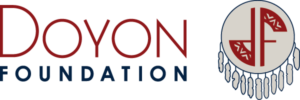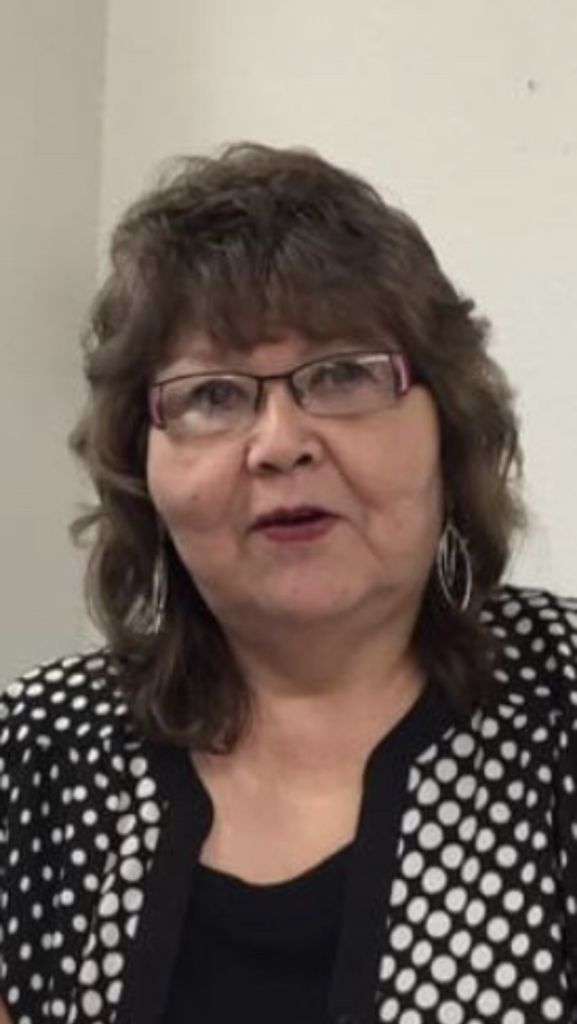“We have to start”
– Verna Hagen, Language Champion
Verna Hagen is a daughter of the late Walter Sanford and Laura Isaac Sanford of Chistochina and Tanacross, respectively. Her maternal grandparents are the late Titus and Annie Isaac of Lake Mansfield and Tanacross, respectively. Her maternal uncle, Chief Andrew Isaac, is remembered for his role in successfully arguing for land rights of Alaska Native people.
A lifelong resident of Tanacross and Tok, Verna is a 21-year employee of Tanana Chiefs Conference as an alternate resource coordinator. Her Alaska Native language is Tanacross, an ancestral language of people in the upper Tanana River region. Verna lives in Tok.
At 67 and looking forward to retirement, Verna Hagen is considering the past as she plans for a future that includes seeing the Native language of Tanacross return to everyday use. It’s a goal that follows in the efforts of her mother, Laura Isaac Sanford, a fluent Tanacross speaker who passed away in 2010.
“I learned a lot from her,” Verna said. “She was my mentor.”
A respected Elder and gifted storyteller in Tanacross and English, Laura Sanford’s contributions include helping to document the Tanacross language in texts such as the Tanacross Learners’ Dictionary and Tanacross Phrase and Conversation Lessons. Laura also worked on an in-progress collection of stories.
Verna is inspired by her mother’s commitment to the language, which ranged from taking part in University of Alaska Fairbanks (UAF) classes and workshops to sitting with friends in her kitchen to practice speaking Tanacross. Born in Dihthâad (Mansfield) and raised in traditions of the Mansfield-Ketchumstuck bands, Laura was revered for her knowledge of the old ways, stemming from a childhood spent on the land.
A recipient of Doyon Foundation scholarships, Verna completed online language courses through UAF and enrolled in Tanacross language classes held in Tok through UAF. Her instructor, Irene Arnold, is among authors of the Learners’ Dictionary, a community-based project with English entry words and nearly 4,500 Tanacross words, including example sentences and clickable links. Among Verna’s goals is to see the Learners’ Dictionary available in Tok-area classrooms.
Tasks in her language courses included making recordings of Elders as they spoke in Tanacross and contributing those recordings to the Alaska Native Language Archive at UAF. Verna sat with her mother, gathering audio and video in 2002 as Laura Sanford spoke Tanacross and told ancestral stories.
Verna’s plans include honoring those efforts, especially as she considers next steps to encourage her community to put the Tanacross language to use in everyday life. “We have to start doing that,” she said.
Verna makes time to speak Tanacross with her aunt, Isabelle John of Tanacross; her sister, Elizabeth Webb of Tok; and a cousin, Rose Benson of Tanacross and Chicago. Several Tanacross and Tok speakers are fluent, Verna said, and she’s eager to resume recordings to expand the pool of Elders whose Tanacross speaking and storytelling are preserved.
“Our Elders are leaving us and we need to preserve the language,” Verna said. “The language is what we’re all about. That’s why we need to get it to the children.” Helping teach the language to schoolchildren is among her retirement goals.
She credits language-learning workshops organized in Tok by Doyon Foundation with attracting good attendance, including people from neighboring communities. “I would love to see more language classes here in Tok and more Doyon workshops,” she said.
About Doyon Languages Online
Through the Doyon Language Online project, Doyon Foundation is developing introductory online lessons for Holikachuk, Denaakk’e (Koyukon), Benhti Kenaga’ (Lower Tanana), Hän, Dinjii Zhuh K’yaa (Gwich’in), Deg Xinag, Dinak’i (Upper Kuskokwim), Nee’anděg’ (Tanacross) and Née’aaneegn’ (Upper Tanana). The project officially launched in summer 2019 with the first four courses, now available for free to all interested learners.
Doyon Languages Online is funded by a three-year grant from the Administration for Native Americans (ANA), awarded in 2016, and an additional three-year grant from the Alaska Native Education Program (ANEP), awarded in 2017.
As Doyon Foundation continues to grow our language revitalization efforts in the Doyon region, we believe it is important to recognize people who are committed to learning and perpetuating their ancestral language. We are pleased to share some of these “language champion” profiles with you.
If you know a language champion, please nominate him or her by contacting our language program director at haytona@doyon.com. Language champions may also complete our profile questionnaire here. You may learn more about our language revitalization program on our website, or sign up to access the free Doyon Languages Online courses here.

